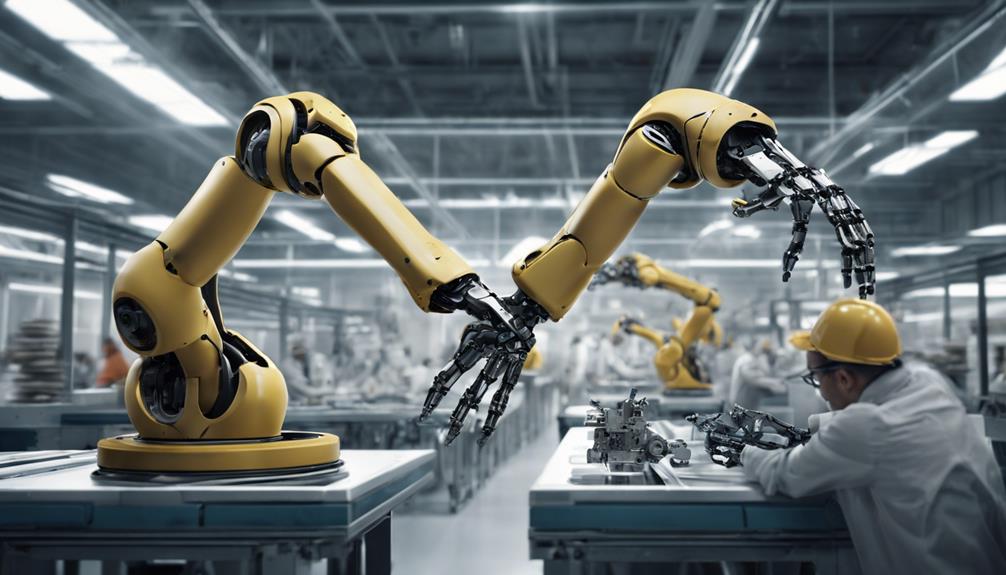In a time when technology is rapidly changing industries, the resilience of certain jobs against the influence of artificial intelligence is becoming a more important subject.
As AI continues to evolve, the demand for roles that require distinctly human skills becomes more pronounced. The ability to navigate ambiguity, exhibit emotional intelligence, and engage in complex problem-solving are becoming hallmarks of job security.
Let's explore the intricate interplay between technology and human expertise in shaping the future workforce, shedding light on the nuanced strategies professionals can employ to future-proof their careers.
Key Takeaways
- Jobs requiring emotional intelligence are safe from AI takeover.
- Creative professions rely on uniquely human qualities AI can't replicate.
- Complex problem-solving roles need human judgment and intuitive leaps.
- Healthcare, teaching, and skilled trades demand human compassion and tailored expertise.
Jobs Requiring Emotional Intelligence
Jobs demanding emotional intelligence, such as counseling and therapy, present a unique challenge for artificial intelligence due to the intricate nature of human emotions involved. In professions where human connection, empathy, and personalized interactions are paramount, AI falls short in providing the necessary social skills. Roles like social work require a deep understanding of individuals' emotions and the ability to offer emotional support on a personal level. This personalized approach is something AI struggles to replicate authentically. Similarly, clergy and religious leaders rely on emotional understanding and creating personal connections with their followers, aspects that are currently beyond the capabilities of AI.
Moreover, in occupations such as nursing, where emotional support is central to providing care, AI lacks the intuition and empathy needed to engage with patients effectively. Personal shoppers, who excel in understanding personal preferences and emotions, rely on a level of human intuition that AI has yet to master. The human touch, emotional intelligence, and personalization embedded in these roles make them uniquely human and resistant to automation by artificial intelligence.
Creative Professions Uniquely Human

In the realm of creative professions, the distinct essence of human creativity and emotional depth emerges as a cornerstone for producing impactful and original work. Creative professions, rooted in artistic expression, rely heavily on the human touch to convey authenticity and originality that resonate with audiences.
Here are five key elements that make creative professions uniquely human:
- Creativity: Human creativity fuels the generation of new ideas and concepts that form the basis of artistic endeavors.
- Emotional Connection: Establishing an emotional connection with the audience is a fundamental aspect of creative work that drives engagement and resonance.
- Intuition: Human intuition guides decision-making processes and artistic choices, leading to innovative outcomes.
- Imagination: The boundless human imagination serves as a wellspring for crafting imaginative and thought-provoking content.
- Problem-Solving: Creativity in creative professions involves tackling challenges through innovative problem-solving approaches that stem from human ingenuity.
In essence, the human touch in creative professions is unparalleled, weaving together elements of creativity, emotional intelligence, and originality to produce work that is both impactful and deeply resonant.
Complex Problem-Solving Occupations
Professionals engaged in intricate problem-solving occupations demonstrate a unique blend of creativity, critical thinking, and adaptability essential for navigating complex challenges effectively. These roles necessitate a high degree of human intelligence, involving pattern recognition, holistic thinking, and the ability to devise innovative solutions to multifaceted issues.
Human judgment and insight are paramount in making strategic decisions and handling ambiguous situations within problem-solving occupations. Individuals in these positions excel at synthesizing information, spotting trends, and implementing creative strategies to address intricate problems.
Artificial Intelligence (AI) faces challenges in replicating the intuitive leaps, emotional intelligence, and nuanced decision-making required in these roles, making them among the jobs least likely to be replaced by AI. The skills and qualities demanded in complex problem-solving occupations highlight the unique value that humans bring to such roles, emphasizing the irreplaceable human touch in navigating and resolving complex challenges.
Careers in Healthcare and Social Work

Within the realm of healthcare and social work, the integration of human compassion and specialized expertise remains a cornerstone that sets these careers apart from potential AI replacement. Professionals in healthcare and social work offer personalized care and emotional support through nuanced human interactions that require a deep level of human empathy and understanding.
The following aspects highlight why these careers are resistant to AI replacement:
- Human Touch: Providing mental health support often involves physical touch, which is a fundamental aspect of therapy and comfort.
- Intuition: Professionals rely on intuition and instinct to gauge the emotional needs of individuals, a skill that AI currently lacks.
- Emotional Intelligence: The ability to navigate complex emotions and offer appropriate support based on individual circumstances is a critical skill in healthcare and social work.
- Holistic Approach: Professionals take into account the holistic well-being of individuals, considering physical, mental, and emotional factors in their care.
- Therapeutic Relationships: Building trust and rapport with clients is essential for effective therapy and support, requiring genuine human connection that AI cannot replicate.
Teaching, Education, and Skilled Trades
The critical role of human educators in providing emotional support, adapting to diverse learning styles, and imparting practical skills sets teaching, education, and skilled trades apart from potential AI replacement.
In the realm of teaching, the ability to connect with students on an emotional level, understand their individual learning styles, and tailor educational approaches accordingly remains a distinctly human skill. Within vocational education and skilled trades, the hands-on expertise and practical skills required are deeply rooted in human experience and intuition, making these professions less susceptible to automation.
The growth projection of 10% in vocational and higher education jobs over the next five years underscores the enduring demand for human educators in imparting specialized knowledge and industry-specific skills. Soft skills such as empathy, leadership, and active listening, integral to the field of education, are challenging for AI to replicate authentically.
As the landscape of work evolves, the human-centric nature of teaching, education, and skilled trades solidifies their position as indispensable professions resistant to AI encroachment.
Frequently Asked Questions
What Are the Jobs That AI Cannot Replace?
Certain jobs evade AI replacement due to their reliance on nuanced human interactions, creativity, innovation, and specialized physical skills. Roles like event planners and teachers, demanding creativity, emotional support, and adaptability, remain irreplaceable by AI.
What Jobs Are Future Proof From Ai?
Future-proof jobs from AI disruption include skilled trades like plumbing, human-centric professions such as nursing, creative roles like event planning, physical-intensive jobs in agriculture, and governmental positions demanding creative reasoning and problem-solving skills.
What Jobs Will Be Lost Due to Ai?
The integration of AI is anticipated to lead to job losses in roles focusing on routine manual tasks, office support, customer service, food services, and fields reliant on language processing. Upskilling is crucial for adapting to the evolving job landscape.
What Jobs Are in Jeopardy With Ai?
As AI continues to advance, jobs like routine data entry, customer service, and manual labor face jeopardy. Businesses benefit from automation's efficiency, yet individuals must adapt by acquiring new skills to navigate the changing job landscape.
Conclusion
In conclusion, the diverse array of professions discussed in 'Top Jobs AI Will Not Replace: A How-To Guide' underscores the enduring value of human skills in an increasingly automated world.
By focusing on roles that demand emotional intelligence, creativity, problem-solving, healthcare expertise, and social work, individuals can navigate the evolving job landscape with resilience and purpose.
It is evident that the human touch and unique abilities of individuals remain essential in driving innovation and progress across various industries.









